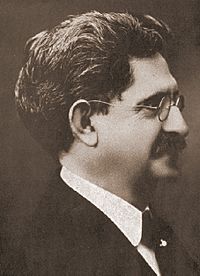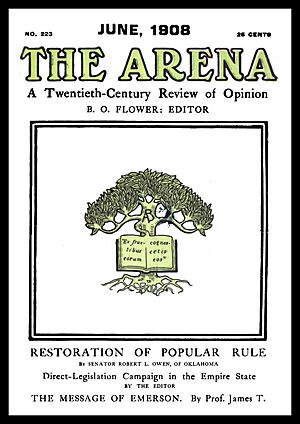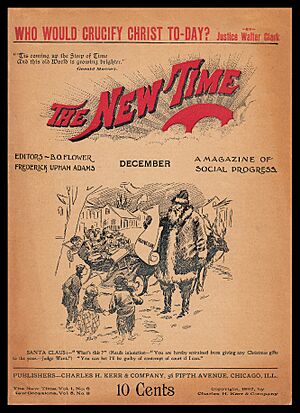B. O. Flower facts for kids
Quick facts for kids
Benjamin Orange Flower
|
|
|---|---|
 |
|
| Born | October 19, 1858 Albion, Illinois, United States
|
| Died | December 24, 1918 (aged 60) Boston, Massachusetts, United States
|
| Other names | B. O. Flower |
| Alma mater | Kentucky University |
| Occupation | Journalist, author |
| Known for | Muckraking journalism, founder of The Arena |
| Spouse(s) | Hattie Cloud |
| Parent(s) | Alfred Flower, Elizabeth Flower |
| Signature | |
 |
|
Benjamin Orange Flower (born October 19, 1858 – died December 24, 1918) was an American journalist. He was known as a "muckraker" during the Progressive Era. Muckrakers were writers who exposed problems in society and business to help make things better. Flower is best remembered for editing The Arena, a magazine that shared liberal ideas. It was published in Boston, New York City, and Trenton, New Jersey, from 1889 to 1909.
Contents
Benjamin Orange Flower's Life
Growing Up and School
Benjamin Orange Flower was born in Albion, Illinois, on October 19, 1858. His father, Alfred Flower, was a minister, and his mother was Elizabeth Orange. Benjamin's grandfather, George Flower, had moved from England and helped start an English settlement in Illinois.
Benjamin first went to a religious school in Albion. Later, his family moved to Evansville, Indiana, where he attended public high school.
After high school, Flower wanted to become a minister, like his father. He started studying at Transylvania University in Lexington. However, his ideas about religion and life changed. He became a Unitarian and decided not to become a minister.
Starting His Career
After college, Flower went back to Albion. He started a short-lived newspaper called the Albion American Sentinel, which stopped publishing in 1880. Then, he moved to Philadelphia. There, he worked as a secretary for his brother, who was a doctor with a successful business.
In September 1886, B.O. Flower married Hattie Cloud.
The Arena Magazine
In 1886, Flower's brother opened a health center in Boston, and Benjamin moved there with him. Flower returned to publishing and started a new magazine called The American Spectator. This magazine did well, reaching over 10,000 readers in three years. In December 1889, Flower combined this magazine with a new one he launched, focused on social improvements, called The Arena.
Flower believed that improving public morals could make society better. In 1893, he suggested creating a "League of Love" or "Federation of Justice." This group would bring together people who wanted to make positive changes for humanity. This idea led to a new organization called the Union for Practical Progress. It tried to set up local clubs across the country. The Arena magazine often wrote about the good work of these local groups, like the Baltimore Union for Public Good. However, this effort did not grow enough and soon ended.
The Arena was a unique magazine that welcomed many different writers and ideas. It featured articles from people who supported cooperatives (where people work together for shared benefit) and populists (who supported ordinary people against powerful groups). It also included ideas from philosophical anarchists (who believed in societies without strict government), socialists, and followers of Henry George and his Single Tax idea.
Flower believed in making social changes step-by-step, not through sudden revolution. He had strong faith that people could become better if they learned more about the world and thought carefully about its problems. Flower supported kindergartens, libraries, and better housing. He criticized fancy, expensive women's clothing, too much focus on money, and the wealthy class that controlled most of society's resources.
The magazine always supported ideas like initiative and referendum (where citizens can propose and vote on laws). It also pushed for prison reform, was against the death penalty, and supported the prohibition of alcohol. Many articles discussed women's suffrage (the right for women to vote), changing divorce laws, the link between poverty and crime, and race relations in the United States.
Flower strongly supported free silver and changes to money laws. He backed William Jennings Bryan in the close 1896 United States presidential election. Flower presented Bryan as a hero who would protect freedom and prosperity. He urged Arena readers to vote for Bryan to stop America from becoming a country ruled by a few rich people (a plutocracy).
In 1896, Flower stopped being the main editor of The Arena. The magazine was then edited by historian John Clark Ridpath and writer Helen Hamilton Gardener. Even with new editors, the magazine continued to follow the same goals Flower had set. Flower kept writing articles for the magazine regularly during this time.
From the late 1890s into the early 1900s, Flower worked with several other reform magazines. He was a co-editor of The New Time, a Chicago magazine, from 1897 to 1898. He worked with Frederick Upham Adams on this magazine, which was an early version of the International Socialist Review. After that, he edited The Coming Age magazine, which was based in St. Louis, Missouri. He moved it to Boston, where it joined with The Arena in 1900.
The Arena was sold in 1903 to Charles A. Montgomery. This ownership was short-lived, ending in 1904 when the magazine was sold to book publisher Albert Brandt. When Brandt bought the magazine, he immediately brought Flower back as Editor-in-Chief. Flower stayed in this role until the magazine faced financial difficulties and closed in 1909.
Flower's Beliefs
Benjamin Orange Flower did not see himself as a socialist. He thought that many socialist ideas were unrealistic and that revolution would only cause chaos. Instead, Flower believed in a "neo-Christianity." This idea focused on people becoming better individuals and rejecting greed and unfairness, which he felt were spread by wealthy people and their political helpers. Flower believed that direct democracy (where citizens have more direct power in government) was the way to bring freedom and opportunities to more Americans.
Flower felt that social problems should not be ignored. He believed they should be openly discussed, and many different ideas should be considered to find good solutions.
Christian Science
In the early 1900s, Christian Science, a Christian religious movement started by Mary Baker Eddy, was a much-talked-about topic. It faced criticism in a series of articles in McClure's Magazine in 1907. Flower spoke up for Christian Science. He said that Christian Scientists were being unfairly attacked with "falsehood, slander and calumny" (lies and harmful statements).
Flower, who believed in "fair play," published a book in 1910 called Christian Science As a Religious Belief and a Therapeutic Agent. This book defended Christian Science practices. Even though he was not a Christian Scientist himself, Flower noted stories of illnesses that were cured through Christian Science treatment, which doctors at the time could not explain. Because of this, Flower supported the growing Christian Science movement.
Later Years and Legacy
After The Arena closed, Flower started a new magazine in Boston called Twentieth-Century Magazine, also focused on social reform. This magazine was short-lived and stopped publishing in 1911.
B.O. Flower passed away on December 24, 1918, at the age of 60. While many of his personal papers were destroyed, some of his writings are kept with his family's papers at Knox College in Illinois.
After his death, Flower was recognized as an important muckraking journalist of the Progressive Era. In 1932, historian C. C. Regier described him as someone who "somewhat naively...believed that if people would but see the evil effects of their acts they would themselves mend their ways." This belief led to a hopeful and positive tone in Flower's work. He was also remembered as a person who "loved painting, sculpture, and literature, and always kept flowers in his office."
Works
- In Defense of Free Speech: Five Essays from the Arena. New York: The Free Speech League, 1908.
- The Bubonic Plague. New York: National League for Medical Freedom, 1910.
 | Aaron Henry |
 | T. R. M. Howard |
 | Jesse Jackson |



